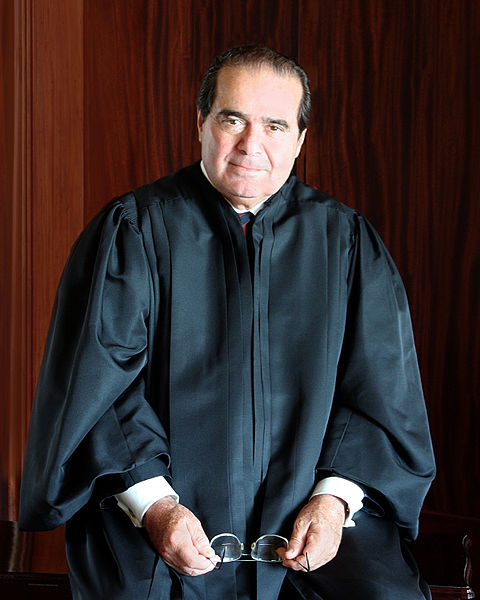
photo credit: Wikimedia Commons
Justice Scalia overheard saying, "Now I can die happy."

photo credit: Wikimedia Commons
IN A LANDMARK 5-4 ruling pitting husband against wife, the U.S. Supreme Court today ruled that wives who are in their child-bearing years can be "tied or otherwise affixed" to a radiator for part of each day, minus Sunday, so that, in the words of the majority ruling, "husbands can engage in free-speech consultation with their wives on procreative matters."
The Roberts court eagerly took up the case of a Mississippi couple, Husband Doe vs. Wife Doe, in which attorneys for the husband claimed that leaving his wife free of the living-room radiator the entire day "might allow her to obtain birth control without the husband's knowledge, thus forcibly limiting the number of children in the household to the current eight."
Writing for the majority, Justice Antonin Scalia said, "No woman of child-bearing age should be given unfettered rights to limit the size of her family without first consulting her lawful husband.
"This court believes that affixing the wife in some reasonable manner to a radiator in the domicile for approximately three to five hours per day affords the husband ample time either to secure his wife's womb from the forcible limitation imposed by birth control, or to engage in free-speech consultation with her to come to some mutual agreement."
Several Supreme Court reporters standing outside chambers overheard Justice Scalia whispering to Chief Justice John Roberts, "Now I can die happy" as the two strolled down the hallway toward the cafeteria.
An exception to the new ruling was inserted by Chief Justice Roberts to allow any wife of child-bearing years to "remain unaffixed to the radiator for the entire day each Sunday," to allow for "the free exercise of prayer, to which a radiator, the court believes, might reasonably be considered to act as a hindrance."
The ruling did not specify whether non-religious women would benefit from the Sunday exception, only saying, "this court neither endorses nor prohibits radiator affixation on Sundays for women who do not profess any faith."
All three female justices were joined by Justice Anthony Kennedy in dissenting, although their argument lacked the intricacy of previous dissents, coming in at only four words and an acronym:
"OMG, we dissent, because DUH."
© 7.16.14 Kate Heidel